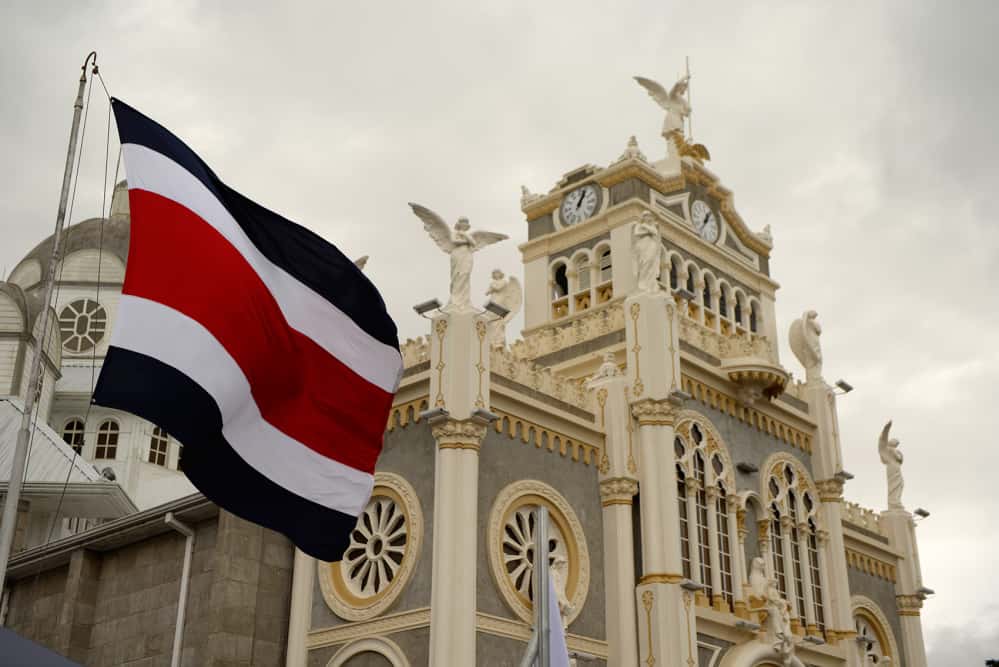While Costa Rica’s status as a Catholic country doesn’t affect the day-to-day lives of most Ticos, it does make news such as Monday’s expulsion of a priest for sexual-abuse allegations more of a national matter.
The Catholic church has faced widespread allegations of sex abuse from high-ranking members, prompting Pope Francis to host a summit on the topic earlier this year. He also spoke in Panama last month of the “wound” left in the Church by sexual-abuse scandals, although he did not condemn specific incidents.
Some of those alleged incidents occurred in Costa Rica. Following Costa Rican priest Mauricio Víquez’s expulsion from the Church, we revisit a January story by AFP’s Marco Sibaja about two of the people he allegedly assaulted.
The story, which we updated to reflect new developments, follows Michael Rodriguez, 38, and Anthony Venegas, 33, who claim to have suffered sexual abuse in their adolescence by the priest.
“This country needs The Vatican to pay attention,” said Venegas, a dental technician. “We need them to realize that not only do these things happen in the United States or Chile, but in Costa Rica and Central America.”
History of abuse
Both reported having suffered abuses at the hands of Víquez when he was pastor of their respective communities, and the two teens served as altar boys in the parish. They reported that the abuses began when the priest touched their genitals, later masturbated them or made mutual or even group masturbation sessions involving other minors.
Rodriguez says he lived that situation between 13 and 17 years old, until Víquez was removed from his community in Tres Ríos, east of San José, and transferred to Patarrá, where Venegas, then 14, lived. With the help of a neighbor, Venegas took his claims in 2003 to the Metropolitan Curia and delivered his complaint to Father José Rafael Quirós, current archbishop of San José.
After that complaint, Víquez was removed from his position in Patarrá but remained part of the church. Anthony Venegas claims that the canonical denunciation protocols were not applied properly. “They promised us anonymity and protection, but none of that was fulfilled,” he said.
Rodriguez did not file a complaint or talk about the abuses suffered until last year, when he went on May 15 to present his formal canonical complaint against Víquez. Since then, he and Venegas have become the visible faces of the struggle for justice for victims of sexual abuse at the hands of priests in Costa Rica.
Each of them also filed a complaint with the Apostolic Nunciature against Archbishop Quirós for the alleged cover-up of their cases.
The Catholic Church answers
The archbishopric of San José sent AFP a written response to Venegas and Rodríguez’s allegations, in which it assures that on July 27, “Mauricio Víquez was suspended ‘Ad Divinis’, which means a deprivation of the ministerial exercise of total and provisional while the cause is concluded in the Holy See.”
The letter said that after Venegas’ complaint in 2003, Father Víquez was separated from his position in Patarrá and received no more “parochial responsibilities.” But Víquez was the church’s spokesperson for family affairs in 2016, advocating for a traditional family structure and opposed gay rights.
The Vatican on Monday permanently expelled Víquez from the clergy. “Rev. Father Mauricio Víquez Lizano, priest of the archdiocese of San José, has been imposed the permanent and expiatory punishment of expulsion from the clerical state,” said the Vatican statement, read before journalists by the spokesman of the Metropolitan Archdiocese of San José, Jason Granados.
Impacts in their lives
Rodríguez and Venegas say that the abuses suffered left them with lifetime hardships. They considered suicide, felt insecurities in their relationships with others and doubted their own sexual identities.
The two said they went to therapy to overcome the traumas. When last year they agreed to show their faces and make their allegations public, they were mocked on social networks. Both say that some people commented that “they sure must have liked it because they spent so many years” subjected to abuse.
“People do not know the power that a religious figure has over someone,” Rodríguez said. Their testimony helped other people dare to report similar cases. Currently, the church says it has nine complaints of child abuse against Víquez, although Rodríguez and Venegas say they know of many more cases and other priests involved.
Their fight now also targets a reform of the penal code so that cases like theirs can come to justice. Currently, cases of sexual abuse of minors expire 10 years after the victim reaches 18 years of age. Both seek the support of deputies and the government to raise this period to 25 years.






